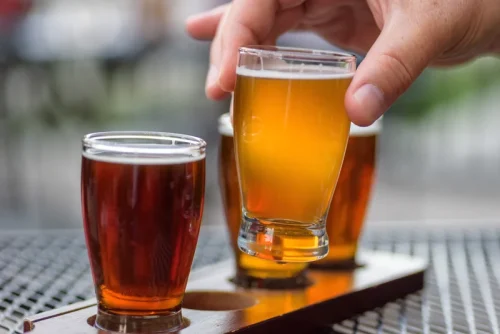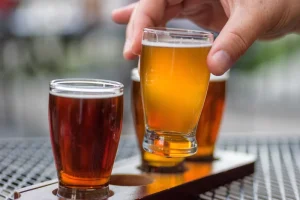
Fruits and vegetables also contain many compounds that can aid in liver detoxification. While they won’t repair permanent liver damage, they can speed recovery. They also help maintain a healthy digestive system, which can be disrupted by alcohol. Incorporating a variety of fruits and vegetables into your daily diet ensures a wide array of these beneficial compounds. But it’s crucial to act now to avoid inflicting permanent damage on your brain or liver. When I was in detox for alcohol withdrawal, I met several people with cirrhosis.
How the Alcohol Detoxification Process Works
In cases where severe deficiency is observed, supplementation with vitamin C, along with thiamine, is recommended. Zinc, found in foods like beef, beans, and nuts, can aid in healing and immune support, contributing to the recovery process. Capsaicin stimulates the release of endorphins – compounds that provide feelings of happiness. It also helps with the withdrawal symptoms that come with quitting drinking such as nausea. Adding a dash of cayenne pepper will give you an extra boost on your journey out from under addiction.

Essential Steps in Alcohol Detoxification

It also affects your body’s ability to absorb B vitamins and folic acid. It can trigger irritable bowel syndrome, acid reflux, and other gastrointestinal illnesses, too. These individuals can provide encouragement, accountability, and assistance during challenging times. Engaging in activities and hobbies that do not revolve around alcohol can also help in developing new connections and interests.
What Is The Best Food for Alcohol Detox and Addiction Recovery?
Joining supportive communities can provide much-needed encouragement and understanding during the recovery process. This evaluation helps in devising a personalized detoxification plan that caters to the specific needs of the individual. Additionally, it allows healthcare professionals to identify any potential medical or psychiatric concerns that may require immediate attention. As you’ve likely noticed, alcohol can provide temporary feelings of happiness and relaxation. Studies show that sugar consumption also triggers euphoric feelings, which may help fill that gap.

Nuts and seeds are nutrient-dense foods that offer a variety of health benefits. They are excellent sources of protein, drug addiction treatment healthy fats, and essential vitamins and minerals. Almonds, walnuts, chia seeds, and flaxseeds are particularly beneficial for recovering alcoholics.

Recovery programs often include nutritional plans tailored to the individual’s needs, addressing specific deficiencies and promoting a diet that supports brain health and reduces cravings. Engaging with a nutritionist or dietitian can be beneficial in creating a personalized nutrition plan that supports long-term recovery and well-being. Chronic alcohol consumption can significantly impair the body’s ability to absorb and utilize essential nutrients, leading to notable vitamin deficiencies. These deficiencies can contribute to a range of health issues that complicate recovery from alcohol dependency. Healthy fats, particularly omega-3 fatty acids in foods like fatty fish, walnuts, chia seeds and flaxseeds, play an essential role in brain health. Since alcohol consumption affects the brain and can lead to conditions like depression and anxiety, these fats can aid in recovery by enhancing cognitive functions and mood.
- Examples of whole grains include quinoa, brown rice and non-instant oatmeal.
- The first step in the alcohol detoxification process is the evaluation and assessment of the individual seeking detoxification.
- If you are ready to begin a life without alcohol, The Recovery Village is here to help.
- Eating may be the last thing you’ll want to think about when it comes toalcohol detox, but it’s an important part of the process.
Our ancestors instinctively knew that organ alcohol recovery diet meats have more nutrient density than the popular cuts that we eat today. When I’m consistently eating a lot of fat from whole food sources, my sense of well-being soars. Juices and sodas account for most of the sugar consumed in the modern diet. These can be replaced with low-sugar kombuchas, unsweetened iced tea, or sparkling waters with natural flavors.
- The Recovery Village Cherry Hill at Cooper provides a full continuum of care, from medical detox and inpatient rehab to aftercare.
- Integrating a balanced diet rich in these nutrients can ease withdrawal symptoms, rebuild strength, and encourage a sustained recovery.
- Heavily drinking increases calorie intake significantly, making you more likely to gain weight.
Nutritional therapy teaches you how to maintain a healthy, nutritious diet that promotes optimal mental and physical health, and that reduces your risk for relapse. By including protein-rich foods, healthy fats, and complex carbohydrates in the diet, recovering alcoholics can provide their bodies with the necessary nutrients to aid in the healing process. It is important to consult a healthcare professional or a registered dietitian for personalized dietary guidance based on individual needs and goals. While these foods are beneficial, it’s equally important to avoid processed foods, sugary snacks and greasy items that can hinder the detox process.
- While eating, try not to eat while you’re distracted by your phone or TV.
- Folic acid is in foods like enriched bread, flour, cornmeal, pasta, rice, and breakfast cereals.
- Including a variety of these nutrient-dense options in your diet can help replenish vital nutrients, support detoxification processes, and promote overall health and recovery.
- Stopping opioid abuse and increasing fiber intake is the only way to get back on track after opioids have hijacked your nutrition.
- Even those who were formerly healthy tend to let their good eating habits go as they become more consumed with the need to find and drink alcohol.
- The liver’s remarkable ability to regenerate is significantly influenced by nutrition, especially in the context of recovery from alcohol-induced damage.
- I’ve also noticed that I respond well to homemade sourdough bread, which contains enzymes that pre-digest much of the starch.
- Replace iceberg lettuce in salads with a variety of the above leafy greens, which are far more nutrient-dense than iceberg varieties.
- These professionals have the expertise to assess your nutritional needs and develop a customized plan based on your specific requirements.
- By selecting the right foods, you are nurturing your body and mind, making the path to recovery a more manageable and rewarding one.
Junk foods’ tendency to make you feel depressed or sluggish can also affect your mental state in addition to bodily organs like the heart and liver. But, alcoholism is also responsible for a lack of other essential vitamins such as =https://ecosoberhouse.com/ vitamins A, D, and E. Lack of vitamin D can cause the body to have difficulty absorbing calcium. Some best grains to avoid during alcohol detox are white rice, processed cereal, and anything made with flour, or cornmeal. These options have no filter content which can lead you to feel sluggish after meals.
Excessive drinking has numerous impacts on your body and mind, ranging from mild to severe. Learn which signs to look out for, and how to care for your well-being. Meal planning in recovery is not just about physical nourishment but also about establishing a routine that supports sobriety and well-being.
